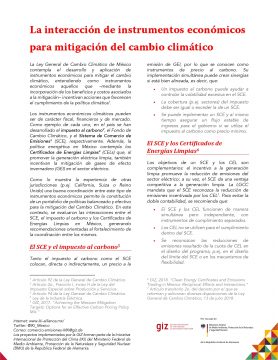In light of the upcoming pilot phase of the Mexican ETS, which is set to begin in 2020, the GIZ project “Preparation of an Emissions Trading System in Mexico” (SiCEM) has been conducting a series of activities which include the development and dissemination of information to support a better understanding of the ETS and its interaction with other policy instruments.
Mexico is committed in the fight against Climate change. Such commitment is reflected in the Climate mitigation targets set both in its Nationally Determined Contributions (NDCs) and its reform to the General Climate Change Law in 2018. To address its commitments, the Mexican government has established a variety of measures: among them, the ETS emerges as a key instrument in the promotion of a low-carbon development and the achievement of its sectoral climate targets.
An ETS is a market-based instrument to reduce Greenhouse Gas emissions. It operates under the principle of ‘Cap and Trade’ (see factsheets), creating a market for emission permits and incentivizing regulated entities to comply in the most cost-efficient way. In parallel, other economic instruments have been implemented in Mexico, creating additional incentives to encourage the transition to a low carbon economy: the carbon tax, and the clean energy certificates (CEL, for its acronym in Spanish).
Experience from other jurisdictions (e.g. California, Switzerland or UK) shows that an appropriate coordination between these different instruments allows for the conformation of a well-balanced and effective Climate change mitigation policy portfolio. Two analyses performed for the Mexican context (Interaction between ETS and CEL, and Options for an Effective Carbon Policy Mix) culminated in a series of recommendations for the simultaneous operation of the ETS, carbon tax and CEL, creating synergies and harnessing the individual potential of each policy instrument to potentialize climate mitigation efforts. The key recommendations have been included in the following document (in Spanish):

The upcoming pilot phase provides with an opportunity to test the interaction between the Mexican ETS and other policy instruments. Additional studies covering a variety of technical issues be published in the “IKI-Alliance Mexico” blog in the coming months. For more information, please contact us at: Comercio.Emisiones-MX[AT]giz.de
